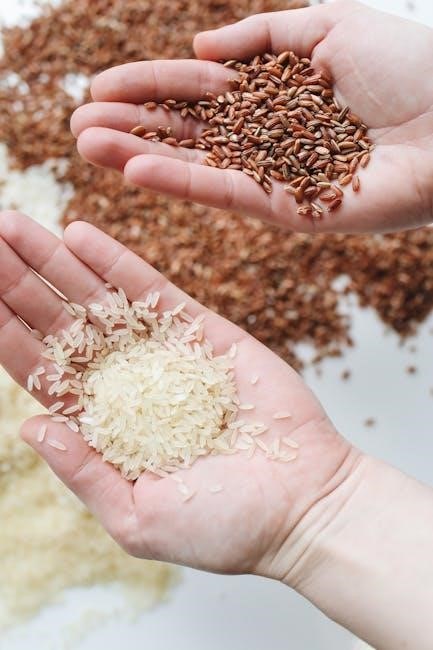
free menopause diet plan pdf
A menopause diet focuses on managing symptoms and improving well-being through balanced nutrition. It emphasizes essential nutrients, healthy eating habits, and tailored meal plans to support women during this transition. Free resources, like the Canadian Cancer Society’s guide, offer valuable insights and practical tips for maintaining optimal health.
1.1 Understanding the Importance of Nutrition During Menopause

Nutrition plays a vital role in managing menopause symptoms, such as weight gain and metabolic changes. A balanced diet helps maintain energy levels, supports bone health, and reduces the risk of chronic diseases. Essential nutrients, like calcium and iron, are often lacking in women’s diets during this phase. A well-planned diet can alleviate discomfort and promote overall well-being; Resources like the Canadian Cancer Society’s guide provide practical advice for creating a nutritious menopause diet plan.
1.2 Benefits of a Tailored Diet Plan for Menopause
A personalized diet plan offers numerous benefits for menopause management. It helps stabilize hormones, reduces weight gain, and minimizes symptoms like hot flashes. Tailored plans ensure adequate intake of calcium and iron, essential for bone health and energy. They also promote better digestion and mental clarity. By focusing on whole foods and healthy oils, a customized diet can enhance overall well-being and provide long-term health benefits. Free guides often outline these strategies, making them accessible to all women.
Key Components of a Menopause Diet Plan
A menopause diet plan emphasizes the Mediterranean approach, featuring fruits, vegetables, and healthy oils, while reducing refined and processed foods. This helps balance hormones and boost energy.
2.1 The Mediterranean Diet: A Recommended Approach
The Mediterranean diet is widely recommended for menopause due to its focus on whole, nutrient-rich foods. It includes plenty of fruits, vegetables, lean fish, and healthy oils like olive oil, while limiting refined and processed items. This approach supports weight management, improves heart health, and reduces the risk of chronic diseases. By emphasizing natural ingredients and balanced meals, the Mediterranean diet aligns well with the nutritional needs of women during menopause, offering a sustainable and beneficial eating plan.
2.2 Incorporating Fruits, Vegetables, and Healthy Oils
Fruits and vegetables are rich in vitamins, minerals, and antioxidants, which help manage menopause symptoms. Berries, leafy greens, and cruciferous vegetables are particularly beneficial. Healthy oils, such as olive oil, support heart health and reduce inflammation. Incorporating these into meals enhances nutrient intake and promotes overall well-being. Aim for variety to ensure a broad range of benefits, and consider adding them to salads, smoothies, or as side dishes for balanced nutrition during menopause. This approach supports long-term health and symptom relief.
2.3 Reducing Refined and Processed Foods
Refined and processed foods can exacerbate menopause symptoms like weight gain and inflammation. These foods often contain unhealthy fats, sugars, and sodium, which can negatively impact overall health. Limiting their intake helps maintain a balanced diet and reduces the risk of chronic diseases. Opting for whole, nutrient-dense foods instead supports better energy levels and symptom management. A free menopause diet plan PDF can provide guidance on identifying and avoiding these foods, promoting a healthier lifestyle during this transition.

Managing Weight Gain During Menopause
Menopause often leads to weight gain due to hormonal shifts and metabolism changes. A balanced diet and regular exercise can help manage this; Free menopause diet plans offer practical strategies to maintain a healthy weight and reduce symptoms.
3.1 Understanding the Causes of Weight Gain
Weight gain during menopause is often linked to hormonal changes, particularly the decline in estrogen levels, which can slow down metabolism and increase fat storage. Additionally, aging naturally reduces muscle mass, further decreasing metabolic rate. Lifestyle factors such as reduced physical activity and dietary habits also contribute. A free menopause diet plan can help address these changes by promoting balanced eating and healthy habits.
3;2 Role of Metabolism and Hormonal Changes
Hormonal shifts during menopause significantly impact metabolism, leading to slower fat burning and increased fat storage. Decreased estrogen levels affect how the body processes energy, often resulting in weight gain, especially around the midsection. A free menopause diet plan can help counteract these changes by focusing on nutrient-dense foods and portion control, supporting metabolic health and overall well-being during this transition.
3.3 Strategies to Maintain a Healthy Weight
Maintaining a healthy weight during menopause involves a combination of balanced nutrition and regular physical activity. Focus on portion control, whole foods, and mindful eating to avoid overeating. Incorporate strength training to build muscle, which boosts metabolism. A free menopause diet plan often includes meal ideas that emphasize lean proteins, healthy fats, and fiber-rich foods. Staying hydrated and managing stress also play key roles in weight management. Download a free menopause diet guide for tailored strategies.

Exercise and Physical Activity
Exercise plays a crucial role in managing menopause symptoms. Activities like strength training and aerobics help maintain muscle mass and metabolism. A free menopause diet plan PDF often includes workout routines to enhance overall well-being.
4.1 Importance of Exercise for Menopause Symptoms
Exercise is vital for managing menopause symptoms, such as hot flashes and mood swings. It improves heart health, strengthens bones, and boosts metabolism. Regular physical activity helps maintain muscle mass and energy levels. Davina McCall highlights the benefits of fitness during perimenopause and menopause; A free menopause diet plan PDF often includes exercise routines to complement dietary changes, promoting overall well-being and symptom relief.
4.2 Recommended Fitness Routines for Women Over 50
A well-rounded fitness routine for women over 50 should include a mix of aerobic exercises, strength training, and flexibility workouts. Activities like yoga, swimming, cycling, and brisk walking are ideal for improving cardiovascular health and maintaining mobility. Incorporating resistance exercises, such as light weightlifting or bodyweight exercises, helps preserve muscle mass and bone density. Aim for at least 150 minutes of moderate-intensity aerobic activity weekly and two strength training sessions. Starting slowly and gradually increasing intensity ensures a sustainable and enjoyable routine.
4.3 Combining Diet and Exercise for Optimal Results
A balanced diet paired with regular physical activity enhances overall well-being during menopause. A nutritious diet provides the energy needed for exercise, while physical activity supports weight management and improves metabolism. Combining these elements helps alleviate symptoms like hot flashes and mood swings. Staying hydrated, timing meals appropriately, and avoiding processed foods further optimize results. This holistic approach not only improves physical health but also boosts mental and emotional well-being, making it easier to navigate menopause with confidence and vitality.

Nutrition Needs for Women Over 50
Women over 50 require increased focus on essential nutrients like calcium, iron, and vitamins. A balanced diet, proper hydration, and mindful meal timing are crucial for health.
5.1 Essential Nutrients for Menopause Health
During menopause, women require specific nutrients to support their health. Calcium and iron are particularly important, as they help maintain bone strength and prevent deficiencies. Incorporating leafy greens, fortified cereals, and lean proteins can provide these essential nutrients. Additionally, staying hydrated and ensuring adequate vitamin D intake supports overall well-being. A balanced diet tailored to these needs can significantly improve menopause symptoms and long-term health outcomes.
5.2 The Role of Calcium and Iron in Menopause
Calcium is crucial for maintaining bone density, reducing osteoporosis risk, while iron combats anemia, common during menopause. Foods like leafy greens, fortified cereals, and lean proteins provide these nutrients. Ensuring adequate calcium and iron intake supports overall health and alleviates symptoms. Supplementation may be necessary if dietary sources are insufficient. A well-planned diet, as outlined in free guides like the Canadian Cancer Society’s resource, can help meet these nutritional needs effectively.
5.3 Hydration and Meal Timing Strategies
Staying hydrated is essential for overall health, aiding digestion and metabolism. Drinking water-rich foods and herbal teas can help manage menopause symptoms. Meal timing strategies, such as eating smaller, balanced meals, can improve energy levels and weight management. Incorporating these practices into your diet plan supports long-term well-being and reduces discomfort. Free resources like the Mediterranean diet guide offer practical advice for implementing these strategies effectively.
Mental Health and Menopause
Mental health is deeply connected to menopause, with diet playing a key role in mood regulation. A balanced diet rich in nutrients supports emotional well-being and clarity. Free resources, like the Canadian Cancer Society’s guide, provide tips for maintaining mental health during this transition. Prioritizing nutrition helps alleviate symptoms and fosters resilience.
6.1 Managing Stress and Anxiety Through Diet
Diet significantly impacts mental health during menopause, with certain foods helping to reduce stress and anxiety. Incorporating omega-3 rich fish, whole grains, and vitamins can stabilize mood. Free guides, like the Canadian Cancer Society’s nutrition guide, suggest balanced eating plans to support emotional well-being. Avoiding processed foods and sugar spikes also aids in maintaining mental clarity and reducing irritability during this phase. A mindful approach to nutrition fosters resilience and overall health.
6.2 The Impact of Sleep on Menopause Symptoms
Sleep plays a crucial role in managing menopause symptoms, as poor sleep can exacerbate hot flashes, mood swings, and fatigue. Research suggests that women experiencing menopause often face disrupted sleep patterns due to hormonal changes. Prioritizing a consistent sleep schedule, a relaxing bedtime routine, and a calming environment can help improve sleep quality. Additionally, a free menopause diet plan PDF may offer tips on how nutrition can support better sleep, further alleviating menopause-related discomforts and promoting overall well-being.
6.3 Mindful Eating and Emotional Well-being
Mindful eating fosters a healthier relationship with food, reducing stress and emotional eating during menopause. By focusing on savoring meals and listening to hunger cues, women can better manage cravings and portion sizes. Emotional well-being is enhanced when eating becomes a mindful, enjoyable experience rather than a reactive one. Incorporating this practice, along with strategies from a free menopause diet plan PDF, can help women navigate emotional challenges and maintain a balanced lifestyle during this transition.

Lifestyle Changes for Menopause Management
Adopting a holistic approach, including regular physical activity, stress management, and avoiding unhealthy habits, supports menopause well-being. A free menopause diet plan PDF can guide these changes, emphasizing balance and sustainability for long-term health benefits.
7.1 Avoiding Unhealthy Habits
Eliminating smoking, excessive alcohol, and poor dietary choices is crucial for menopause management. A free menopause diet plan PDF often highlights the importance of avoiding processed foods and sugary snacks, which can exacerbate symptoms. Instead, focus on whole, nutrient-rich foods to support hormonal balance and overall health. These lifestyle adjustments, combined with mindful eating, can significantly improve well-being during menopause, making it easier to navigate this life transition with confidence and vitality.
7.2 The Role of Social Support in Menopause
Social support plays a vital role in managing menopause symptoms and improving mental well-being. Connecting with family, friends, or support groups can reduce feelings of isolation and stress. Sharing experiences and advice within a community fosters emotional resilience. A free menopause diet plan PDF often emphasizes the importance of a strong social network in maintaining motivation and adherence to healthy lifestyle changes during this transition.
7.3 Setting Realistic Goals for Diet and Lifestyle
Setting realistic goals is crucial for long-term success in managing menopause symptoms. Start with small, achievable changes to your diet and lifestyle, such as incorporating more vegetables or walking daily. Celebrate milestones to stay motivated; A free menopause diet plan PDF often includes tips for gradual adjustments, ensuring sustainability. Focus on progress, not perfection, and adapt goals as needed to suit your unique needs and preferences.
Embracing a balanced diet and healthy lifestyle eases menopause symptoms. A free menopause diet plan PDF offers practical guidance, ensuring women can navigate this transition with confidence and vitality.
8.1 Summary of Key Takeaways
A well-structured menopause diet plan is essential for managing symptoms and improving overall health. Key takeaways include emphasizing nutrient-rich foods, staying hydrated, and incorporating physical activity. A free menopause diet plan PDF provides practical guidance, helping women make informed choices. Balancing nutrition with lifestyle changes supports long-term well-being and alleviates common challenges associated with menopause. By focusing on whole foods and mindful eating, women can navigate this phase confidently and maintain their health effectively.
8.2 Embracing a Holistic Approach to Menopause Health
A holistic approach to menopause health combines nutrition, exercise, and mental well-being for optimal results. By integrating a balanced diet with regular physical activity and stress management, women can effectively manage symptoms and enhance their quality of life. A free menopause diet plan PDF offers a comprehensive guide to achieving this balance, ensuring sustainable health benefits that go beyond just dietary changes, fostering overall well-being during this life transition.